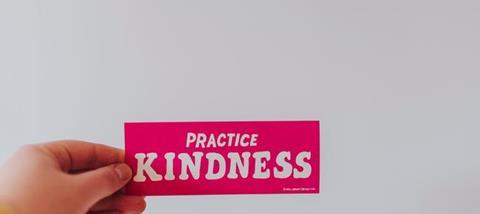
My friend Lucy is one of the kindest people I know. A short time after we met I remember thinking there was something different about her, but I couldn’t put my finger on what it was. Then one day when I was having a bit of a moan about someone, she changed the subject. It suddenly clicked! I’d never heard Lucy say anything bad about anybody.
Once I’d realised it, I noticed it all the time. If I said something negative about someone she’d either stay quiet, change the subject or say something like: “Maybe they were having a bad day?” Lucy’s gentleness and kindness shone a bright spotlight on the way I behaved!
Recently Lucy challenged me to try a whole week of being as kind as I possibly could be. I accepted the challenge but oh. My. Goodness. It was hard! A lot of the time I felt like a failure – unkind words slipped out unintentionally, I was moody at home and I found myself gossiping on more than one occasion.

It turns out that being kind is tough! But as the week continued I saw more and more opportunities to be kind and I took them. I am (slowly but surely) developing a habit of looking out for others and being kind with the words that I say.
So, how can we aid the growth of kindness in the lives of our children and young people? (And our own!)
Talk kindness
It begins with a conversation about what kindness is, which goes deeper than the niceties. When I began researching the subject of kindness for Koko’s film Dare to Care I was amazed to learn about the science behind it! From the serotonin, to the endorphins and oxytocin (look it up!), it’s fascinating! Do we underestimate the impact of one kind act? Discuss together the potential impact and benefits on us and our families, friendships and communities.
Set the challenge
I’m convinced that if we want to see our children and young people develop this brilliant and beautiful habit of kindness then we need to set them a challenge, much like Lucy did to me. Can you challenge them to spend a whole week trying to be as kind as they can?
Now, it feels a bit weird suggesting that they try it for a week, because it sounds like after that they can stop. But it’s about being intentional, when I tried the week it was a real wake up call that, actually, I wasn’t very good at it! The challenge is to develop kindness as a discipline and to become utterly determined to grow the spirit of kindness in our lives.
Perhaps you can facilitate a time where you chat about whether there are specific areas of kindness that they know they need to work on. Is there is a specific person that they know they need to befriend, or is it that they never clear the table after a meal? Do they have a habit of gossiping? What is it that they’re going to choose to do differently this week?
Pray for courage
We need to make sure we prepare them with the fact that kindness often demands us to be brave. It takes boldness to help the stranger or invite someone who looks lonely to play a game with us in the playground. Living a life of kindness is a radical way to live, it goes against much of what society teaches us – ignore them, hurt them back, it’s not your problem. This is a great opportunity to pray for one another that God would give us a greater awareness of the opportunities to be kind and the courage to step out to show love to others.
Study and memorise the scriptures
There are many different passages about kindness in the Bible that you could study together. I particularly love the parable of The Good Samaritan (Luke 10) and Colossians 3:12, which says: “So, chosen by God for this new life of love, dress in the wardrobe God picked out for you: compassion, kindness, humility, quiet strength, discipline.” It goes on to mention forgiveness, temper, and love – what an excellent passage to study! The act of ‘putting on’ this wardrobe is something they can be encouraged to visualise every morning.
And study Jesus! The stories of his life are rich with acts of kindness, we can learn so much from the way he touches the untouchable and loves the unlovable.
It would be so great for your children and youth to memorise a verse about kindness. This one is short, sweet and so powerful: “Be kind and compassionate to one another, forgiving each other, just as in Christ God forgave you” (Ephesians 4:32).
Model it
I’m so thankful Lucy challenged me to a week of kindness, which has deeply impacted me and the way I speak and live. And so, I want to challenge you, why don’t you try that week of kindness before you challenge the children and youth? Then it’s rooted in reality and you’ll be able to speak about it from a place of authenticity. They’re watching the way you speak to others and the way you act so let’s work hard at growing the spirit of kindness in our own lives in order to be the best role models we can be.
I so hope that our Dare to Care film is a useful conversation starter for you as you shine a light on this subject and encourage those in your care to develop this brilliant and beautiful habit.
Koko has just launched a new film called Dare to Care, looking at some of the issues around kindness and suggesting we make it more of a habit in our lives.
To have a monthly resource to give you a hug, a challenge or a new idea why not subscribe to YCW?




























